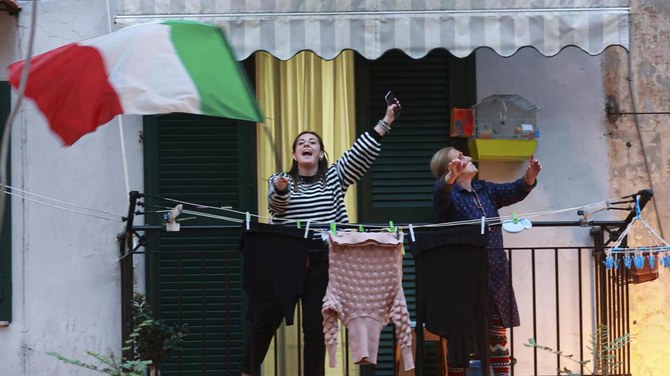ROME: As Italians adjusted to life under quarantine, 6 p.m. had become the highlight of the day for many. Every day, people would take to their balconies and rooftops to take part in a “musical flash mob” aimed at lifting people’s spirits.
But as the national lockdown due to the coronavirus pandemic is set to go on at least until Easter, if not longer, Italians are no longer singing.
In the early days of the lockdown, the idea of a daily musical flash mob was a hit across the country.
Day after day, right before sunset, people would open their windows, put out a national flag and start singing as loudly as possible.
Social media was quickly filled with videos of people singing from their windows and playing tambourines on their balconies nationwide.
Even Lombardy, the region with the highest number of infections and fatalities, joined in enthusiastically.
Some musicians put powerful loudspeakers on their balconies and performed concerts. Every daily performance was opened by the national anthem, followed by well-known Italian songs.
Musical competency was not a requirement, nor was possessing an instrument. A pot or wooden spoon could suffice. A recording made in the city of Siena has been viewed more than 600,000 times on Twitter.
Italian singer Andrea Sannino made a compilation on his Instagram feed that shows people singing his song “Abbracciame” (“Embrace Me”) in his hometown Naples.
The 1990s song “Grazie Roma,” with the lyric “tell me what it is that makes us feel like we’re together, even when we’re apart,” is also popular online.
Quieter neighbors had been using social media to encourage Italians to put up placards on their homes that read “andra tutto bene” (“everything will be OK”), accompanied by a picture of a rainbow.
Everyone seemed happy to let off steam while effectively living under house arrest. “Music has provided unity in times of division throughout history; now Italians are showing the world that, if only for a moment, it can also help them transcend the anxiety brought by a pandemic,” said sociologist Bruno de Masi.
But as the death toll rose and restrictions remained, people stopped joining the flash mobs. Now, if one sings, they might be interrupted by somebody shouting “smettila, vai a casa” (“stop it and go home”). Meanwhile, social unrest is mounting, especially in the poorer south.
“They’re no longer singing or dancing on the balconies. Now people are more afraid, not so much of the virus but of poverty,” Salvatore Melluso, a priest at Caritas Diocesana di Napoli, a church-run charity in Naples, told Arab News.
“That applies everywhere. Both in the more affluent north and in the historically poorer south of the nation, many are out of work and hungry,” he said while counting donated packs of pasta and cans of lentils and beans.
“Queues at food banks are becoming longer and longer. In this situation, there’s nothing to sing about at all,” he added.
“Every Italian likes to sing. Everyone feels like a little Pavarotti here, and we’re all fond of music. But let’s face it, singing may cheer you up for five minutes, then you need to eat something — or you die.”




























